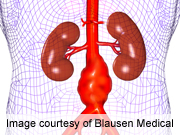
MONDAY, Jan. 27 2014 (HealthDay News) — A one-time screening for a form of potentially dangerous aneurysm is effective and recommended for men aged 65 to 75 who are current or former smokers.
So says a draft recommendation issued Monday by the influential panel of experts known as the U.S. Preventive Services Task Force.
At question is a test to spot an abdominal aortic aneurysm. This condition is a bulge or ballooning in part of the aorta, the main artery that carries blood from the heart to the rest of the body.
According to background information supplied by the expert panel, the aorta travels through the abdomen, and bulging in the vessel often causes no outward symptoms. These aortic anomalies, however, can sometimes burst — with often fatal results.
“Older male smokers are at the highest risk [of developing the aneurysms],” task force co-vice chairman Dr. Albert Siu said in a panel news release. “The good news is that, if you are a 65- to 75-year-old man who smokes or used to smoke, one-time [aneurysm] screening with an ultrasound, along with appropriate treatment, can reduce your risk of dying from a rupture.”
The guidance for nonsmokers was less definitive. According to the task force, men aged 65 to 75 who have never smoked should talk to their health care provider about whether they might benefit from one-time screening for the aneurysm.
The task force also said further research is still needed to assess if screening is beneficial for women aged 65 to 75 who are current or former smokers.
Screening is not recommended for women who have never smoked. Because these women have a less than 1 percent chance of developing an abdominal aortic aneurysm, screening offers very little benefit and may even cause harm, the panel said.
The recommendation statement was posted Jan. 27 on the task force website, and the guidelines are open for public comment until Feb. 24. A final statement will be issued sometime after that.
Controlling heart disease is key to lowering a person’s odds for an abdominal aortic aneurysm, said task force member Dr. Kirsten Bibbins-Domingo.
“There are many other things that men and women of all ages can do to reduce their overall risk of developing [heart] disease,” Bibbins-Domingo said in the news release. “These include including quitting smoking; eating a healthy diet and maintaining a healthy weight; engaging in physical activity; and keeping blood pressure and blood cholesterol under control.”
More information
The Society of Interventional Radiology has more about abdominal aortic aneurysm.
Copyright © 2026 HealthDay. All rights reserved.

